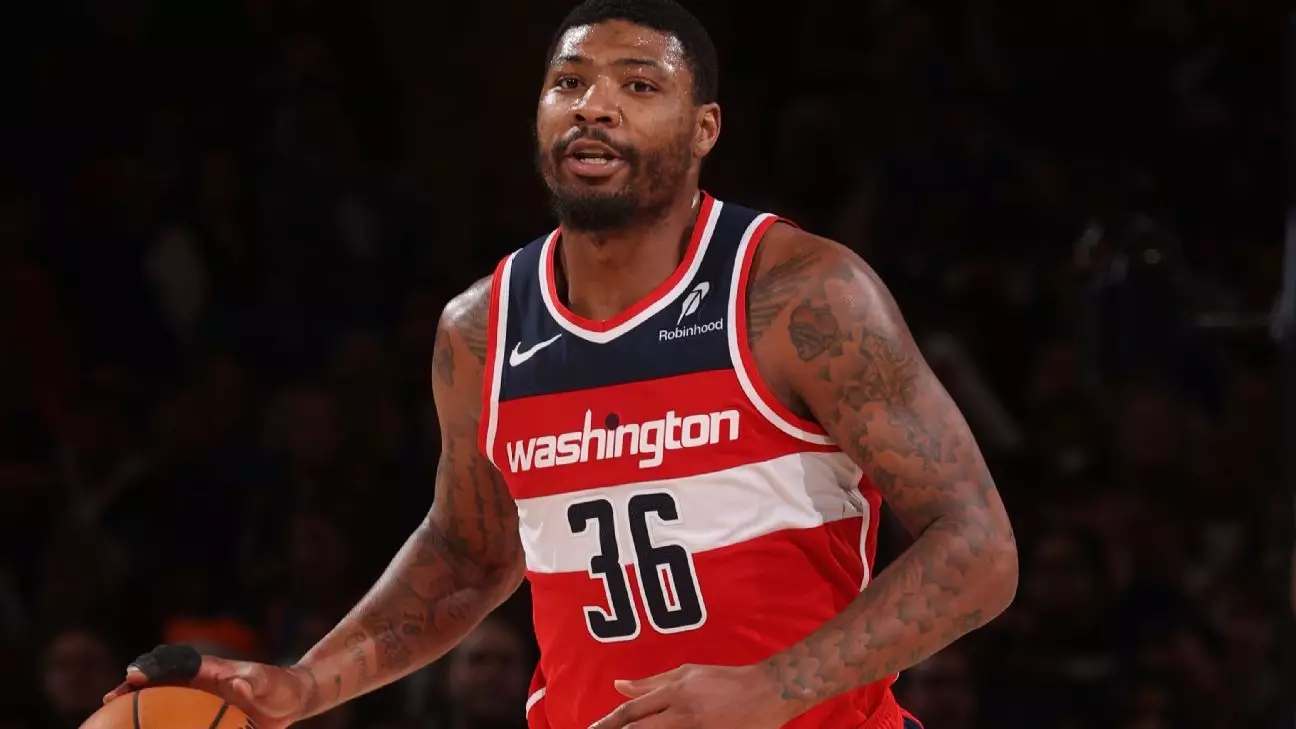In the realm of sports, intensity and passion are essential components that elevate games from mere competitions to emotional spectacles. However, there comes a point when that fervor morphs into something unsettling, something utterly unacceptable. Recent events involving former Boston Celtics guard Marcus Smart serve as a poignant reminder of the dark underbelly of fanaticism. While it’s easy to label a rowdy stadium as a coliseum of unrestrained zeal, when does that enthusiasm cross the precipice into toxicity?
The Incident: A Disturbance at TD Garden
During a seemingly routine game against the defending champion Celtics, Marcus Smart found himself embroiled in a disconcerting altercation. As the game progressed with the Celtics dominating the Washington Wizards, a fan heckling from the sidelines escalated to a level that Smart deemed “crossing the line.” His plea for security intervention illustrates the growing issue of fan behavior in sports arenas. With Boston leading by a staggering margin, one would expect the environment to be celebratory rather than combative. Yet therein lies a bitter irony; the very venue that should symbolize community and passion instead became a battleground of disrespect.
Smart’s assertion that he does not tolerate line-crossing highlights an important aspect of athletic integrity. An athlete must demonstrate resilience both on the court and off it, yet expecting professionals to handle outright verbal abuse in silence is ludicrous. Ultimately, the boundaries of acceptable fan conduct must be established and enforced rigorously to preserve the sanctity of the game itself.
A Player’s Journey: From Hero to Villain
Marcus Smart’s return to Boston was meant to be a ceremonial homecoming, yet the hostile interaction threatens to tarnish that sentiment. The player who spent nine formative years honing his skills and building emotional connections with fans and teammates found himself in the midst of an unsavory dispute with an unidentified spectator. It’s a jarring reminder of how quickly admiration can sour. A city that once applauded him now has elements that would gladly hurl insults in an effort to provoke emotional reactions.
Beyond the rivalry with the Wizards, this situation raises questions about the increasingly partisan nature of fandom in sports. Can we still admire and honor our heroes when they wear different colors? Or does loyalty to one’s team now extend to dehumanizing former players who have moved on? The emotional ties in sports should transcend jersey colors, yet the growing polarization strips away the decency that ought to govern our support.
The Impact of Leadership and Support
As Smart navigates this new chapter with the Washington Wizards, his leadership qualities shine through. Wizards coach Brian Keefe has noted how Smart’s experience is invaluable in cultivating young talent. This contradicts the narrative often painted by toxic elements within fan bases. While many ardently support their team, they must recognize the value that seasoned players bring to their organization, irrespective of past allegiances.
The splendid sacrifices Smart made for Boston are not easily forgotten, but they also shouldn’t be forgotten in the heat of competition. It is imperative for fans to recognize that a player’s journey remains complex, marked by both challenges and triumphs, and that redemption should not be solely dictated by the color of one’s jersey.
A Call for Empathy and Understanding
There’s a change that must occur; a systemic shift in how we approach our sports culture. The harsh reality is that there are lines that shouldn’t be crossed, even by well-intentioned fans. Athletic events should remain a bastion of emotional expression, but that must be facilitated with respect and decorum. Instead of treating former players as adversaries, we should honor their past contributions — not simply in nostalgia but in ongoing support and empathy.
The environment created at sporting events can either uplift or degrade. It’s time for fans to realign their passion for their teams with an acknowledgment of the humanity present within athletic competition. Everyone, from the star player to the fan in the stands, plays an integral role in shaping the narrative of sportsmanship. And what greater legacy could a sport hope to achieve than one characterized by empathy, respect, and a shared love for the game?


Leave a Reply